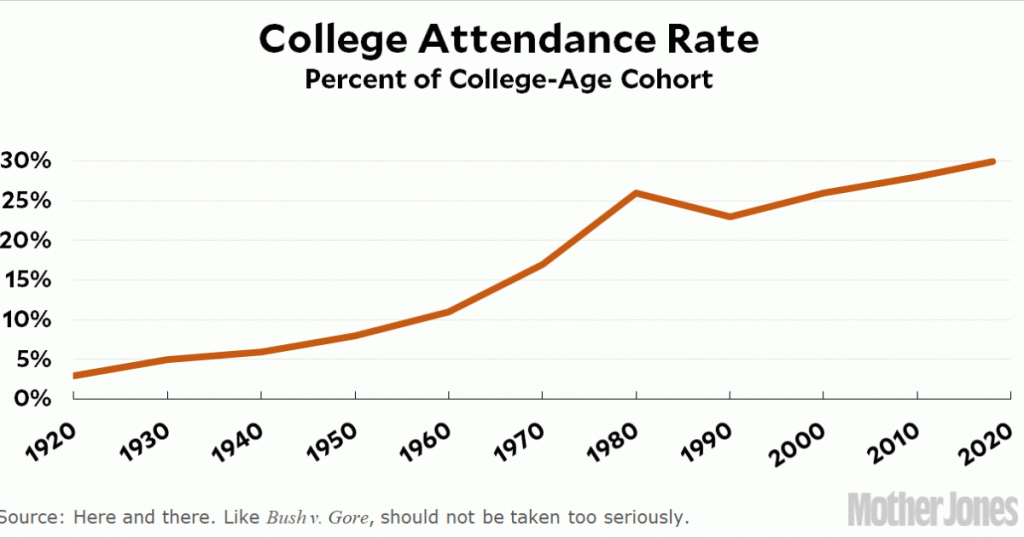Here’s My Take on Free College For All
A few days ago I was chatting with friends about the high cost of college and whether we should do something about it. I’ve been on the fence about this for a while, and one reason has to do with who benefits from a university education these days. Obviously all of society benefits, but that’s not what I mean. I’m talking about who, specifically, benefits the most.
Here’s a nickel summary of college over the past century. In my grandparents’ generation, college was expensive and almost nobody who wasn’t already well-off attended. Both my grandfathers, for example, wanted to go to college and would have done well, but they were working-class kids and it was out of the question.
This changed during my parents’ generation. After World War II, we actively pursued a policy of sending working-class children to college and making it cheap. Both my parents went to USC, even my working-class mother who attended on a scholarship. By my generation public universities were all but free, but they increasingly served the middle class. Finally, in the generation after that, the cost of public universities rose tremendously and the working class was served less and less. That brings us to the present: today, the vast majority of 4-year college students are middle-class or upper middle class, and for a variety of reasons this is unlikely to change much.
So: should public taxes be used to educate the sons and daughters of the working class? You bet, and that’s what we did in the ’50s and ’60s. Should public taxes be used to educate the sons and daughters of the upper middle class, who will use that education to land jobs that pay far more than any working-class kid can hope for? Hmmm. That’s a lot less clear.
There’s also the problem that public universities are run by the states, but on the campaign trail the notion of free college is treated as a federal issue. That’s a bad mix. It’s really hard to get the incentives and rules right when states set the price but the feds are paying the bill.
So that’s two reasons to be skeptical of free college for all. Here’s the third one: on the list of top domestic issues facing us, I just don’t think it ranks very high. Here’s my very rough (and non-exhaustive) personal ranking:
National healthcare
Climate change
Labor union reform/card check
$15 minimum wage
Childcare
Black/white education gap
Immigration
Redistricting reform
Lead remediation
Charter schools
Campaign finance reform
Free college
Gun control
Middle class tax cut
Reparations
My rankings are, broadly speaking, a combination of how important a topic is and how likely it is to get something done about it. For example, even if gun control and reparations are more important than I think they are, I don’t think there’s the slightest chance of getting anything serious accomplished on those fronts. So why bother wasting political and emotional energy on them? Likewise, I think the black/white education gap would move up to fourth on my list if it were based solely on societal importance, but I’ve moved it down because it’s so enormously difficult to figure out what we can do about it.
Obviously you might disagree, and I’m not trying to convince you of anything here. This is just me. And while I could be persuaded to move things around here and there, I don’t think I could be persuaded to make any drastic changes. Given all the other problems facing us, I just don’t think the cost of college even makes the top ten, let alone the top five—and realistically, we’d all be over the moon if we could make real progress on even the top five. Personally, I consider the top three to be in a class of their own, and I’d be pretty happy if essentially all of our energy were spent on them.
So, anyway, there you have it: my take on free college. It sounds great, and I’ve got nothing really against it. But it’s nowhere near important enough for me to think it should be a major campaign issue.





